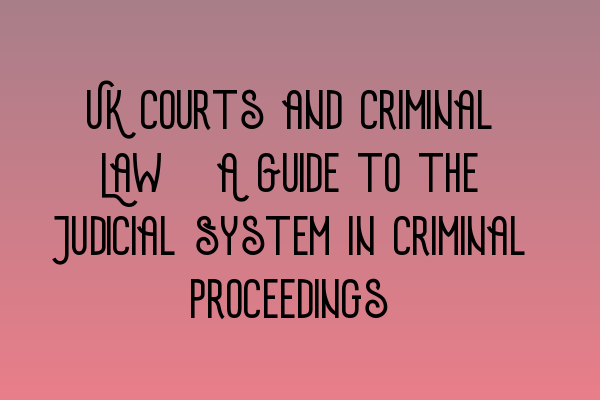UK Courts and Criminal Law: A Guide to the Judicial System in Criminal Proceedings
Welcome to SQE Criminal Law & Practice Law UK. In this article, we will provide you with a comprehensive guide to the judicial system in criminal proceedings in the UK. It is essential to understand the structure and processes of the courts in order to navigate the criminal justice system effectively.
The UK Judicial System
The UK judicial system is divided into different tiers, each with its own jurisdiction and responsibilities. These tiers are:
- Supreme Court of the United Kingdom
- Court of Appeal
- High Court
- Crown Court
- Magistrates’ Court
Understanding the role of each court is crucial when dealing with criminal proceedings. Let’s take a closer look at each of these courts:
Supreme Court of the United Kingdom
The Supreme Court of the United Kingdom is the highest court in the country. It hears appeals from lower courts and deals with cases that raise issues of general public importance. For more detailed information, you can read our article on Demystifying the Solicitors Qualifying Examination Format.
Court of Appeal
The Court of Appeal sits below the Supreme Court and hears appeals from the Crown Court, High Court, and certain tribunals. It reviews decisions made by lower courts, ensures that the law is applied correctly, and addresses any legal errors. For a step-by-step guide on LLC formation, refer to our article on LLC Formation Made Simple: Step-by-Step Guide for UK Entrepreneurs.
High Court
The High Court is responsible for handling more serious criminal cases, as well as civil cases. It has three divisions: the Queen’s Bench Division, the Chancery Division, and the Family Division. The High Court has the power to hear appeals from lower courts and review their decisions. You can find a comprehensive overview of business regulations in the UK in our article on Business Regulations in the UK: A Comprehensive Overview.
Crown Court
The Crown Court deals with more serious criminal cases, such as murder, rape, and robbery. It consists of a judge and a jury and is responsible for conducting trials. The Crown Court also hears appeals from the Magistrates’ Court. To gain a comprehensive understanding of different corporate structures, refer to our article on Decoding Corporate Structures: A Comprehensive Legal Insight.
Magistrates’ Court
The Magistrates’ Court is the first point of entry for most criminal cases. It deals with less serious offenses, such as minor assaults, traffic offenses, and petty theft. Magistrates, who are trained volunteers, preside over these cases and make decisions. For a step-by-step guide on LLC formation, refer to our article on LLC Formation: A Step-by-Step Guide for UK Entrepreneurs.
Conclusion
Understanding the UK courts and the judicial system in criminal proceedings is essential when dealing with legal matters. Whether you are involved in a criminal case or simply want to expand your knowledge, having a grasp of the court structure and their functions will greatly benefit you. For more information or assistance in criminal law matters, contact SQE Criminal Law & Practice Law UK.
Did you find this article helpful? Check out our other related articles:
